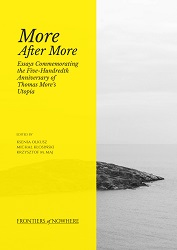
We kindly inform you that, as long as the subject affiliation of our 300.000+ articles is in progress, you might get unsufficient or no results on your third level or second level search. In this case, please broaden your search criteria.





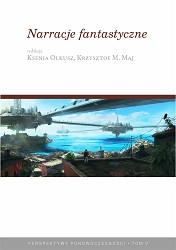
Joanna Łapińska proposes an analysis of several affectionate relationships of contemporary cyborgs in the latest Anglo-Saxon science fiction films and television series. The contemporary cyborg in science fiction cinema is no longer just a hypermasculine “terminator”, a “robocop”, or a ruthless female killing machine like Eve VIII from Eve of Destruction. Cyborgisation is now a much more complex and ambiguous phenomenon and, with progress in biotechnology permeating many areas of life, it raises the question of distinguishing between a “natural human being” and an “artificial” one. Today’s cyborg has become more and more like a human being living in a postmodern or, soon to be, posthuman society. Mankind is now entering into realtionships that are difficult to define and to name with technology. These relatioships include love, intimate and erotic relations. Łapińska looks at the several love relationships of contemporary cyborgs from the science fiction films, Uncanny (2015) and Sight (2012) and the television series, Black Mirror (2011) and Westworld (2016). Her intention is meant to indicate possible ways of interpreting cyborg lovers on screen. In the analysis, she utilizes, therefore, cultural theories emphasizing the breakdown of classical, coherent, humanistic, phallogocentric subjectivity of humans and those attempting to replace this notion with “posthuman” subjectivity—which is inconsistent, dispersed, and relational. These are the most important theories that she recognizes. However, there are others that Łapińska recognizes; the pioneer concept of the cyborg by Donna Haraway, the concept of posthumanism by Rosi Braidotti, as well as select contemporary affection theories. Contemporary science fiction cinema participates in showcasing the departure from the paradigm of humanity as essentially defined by problematizing the issue of emotion/affection as not belonging exclusively to the humans, but possibly to the robot or the cyborg as well. The current envisionment of the cyborg, especially with its edgy and transgressive qualities, is the product of “nature-culture” dichotomy—man and machine living in symbiosis. This will not always be an easy shift in paradigms but it remains unavoidable and undeniable today.
More...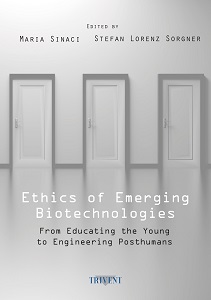
A central theme in the bioethical debates of the 21st century is humanenhancement, approached from different perspectives, such as cognitive or aestheticenhancement – however, the most provoking approach is that of moral enhancement.A society with a majority of moral people is a historial dream of humankind, andsome researchers argue that we may be nearing it. This chapter discusses severalconceptual and ethical issues resulted from moral enhancement. It aims to show thattoday’s direct interventions of moral enhancement, which are supposed to make manmore moral, fail in their aim to make the world a better place.
More...
This chapter will consider the significance of public deliberation for decision-making on bioethical issues. In the past couple of decades, deliberative democracy has become the dominant point of view in democratic theory. There is no doubt that bioethics is the field marked by numerous reasonable disagreements. However, some authors have expressed a view that it is precisely because of this that deliberative democracy can be of immense importance in this context. In this chapter, I will primarily discuss the role of public deliberation on human biomedical enhancements. This is the reason why I will discuss the view of Alan Buchanan, who maintains that in order to face problems associated with biomedical enhancements, it is crucially important that there be an appropriate institutional framework.
More...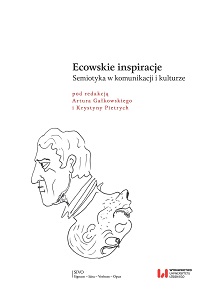
The purpose of my paper, signaled in the title, is a description of the phenomenon of deixis in the perspective of critical discourse analysis, in particular: a) the function it serves in the socrealistic propaganda transmission; b) its text-creating role respect to ideological, rhetorical (totalitarian) actio and presenting its role for the normative rules of presentation, which are imputed in it or imposed by it. In other words, deixis should be understood broadly, not only as a kind of transitive morphological units of expression (Lyons), but as a kind of “skeleton” of Stalinist / socrealistic semiosis. Deixis is a kind of rhetorical grip, its specificity includes the performative act of founding, among others, structure of the discursive “We” (pluralis sovieticae, collective, communist community), which allows the application of socialist habitus in the anthropological sphere, using variously targeted forms of the message (whereas deontic modality, accompanying it, and position of discursive Agens, or administratory rules of communication at that homophonic system are hidden). I base my rhetorical analysis on various texts of Stalin era, texts that form a hierarchical system of cross-dependence (allegations like: Stalin-Bie¬rut- “committed journalism”), leading from ideological arche-text in which invariants are formulated, through the form of translation of that set ideologems of a political and axiological nature to the aesthetic code, to further mimetic reproduction of that message in subsequent texts.
More...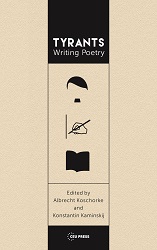
Since Stuart Schram and Joachim Schickel’s studies of Mao Zedong’s poetry,many share the view that Mao’s poems are the best—indeed, the most vivid and lively—evidence of his ability to combine tradition and modernity, Chinese and Western tradition. In short, they demonstrate his ability to “Sinicize Marxism.”
More...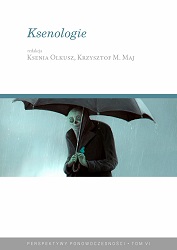
Theoretical introduction to the book overviewing the most recent phenomenological approaches to the otherness with particular emphasis on Bernhard Waldenfels' projects of responsive phenomenology, phenomenology as xenology, and so-called 'xenotopography' (topography of the other).
More...
The aim of this chapter is to present a phenomenon of refugeeism in the existential perspective, i.e. with the use of the terms described by Jean-Paul Sartre and Simone de Beauvoir. The thesis of the article is that the process of integration, considered as one-dimensional, leads to an institutional exclusion of refugees arriving to Western-European countries and deprives them of a freedom to form their own subjectivity due to the practices of isolating foreigners from the autochthons. The consequence of this is that refugees are defined as enemies who, thereby, suffer from a dehumanisation. Consequently, they cannot transcend—create themselves as being-for-itself. The social and institutional exclusion of foreigners is also claimed here to be stabilised by nationalist attitudes noticeable amongst inhabitants of host societies Therefore, the chapter presents solutions which can provide refugees with possibilities for constructing their own being-in-the-world in a free and responsible manner.
More...
In the chapter, Agnieszka Więckiewicz presents the history of a development of the Hungarian psychoanalytical school in the first two decades of the twentieth century in Hungary. The fate of psychoanalytical school in Budapest is one of the most tragic examples of a destruction of the psychoanalytical movement established by Sigmund Freud. Difficult political situation in Hungary has inhibited the progress of the Freudian thought in the medical society. The author focuses on the history of Hungarian psychoanalysis in the light of emigration and displacement which made a huge impact on psychoanalytical thought and practice in Hungary. Besides the author presents the story of Sándor Ferenczi – one of the most crucial figures in the Budapest School of Psychoanalysis. The aim of the chapter is to introduce the history of the Hungarian psychoanalysis which is still very little known in Polish science. The author argues that the history of psychoanalysis in Hungary is a complex story of difficult, and sometimes contradictory, experiences of exclusion, antisemitism, war, forced emigration, displacement as well as of an utopian faith in political and civil revolution. In the first part of the chapter the author talks about the beginnings of psychoanalytical mouvement in Hungary. Between 1908-1918 the Freudian thought had inspired not only medicine and medical practice but also the new Hungarian literature. The author shows the complexity and multidirectionality of a path in which Freudian thought transferred to Hungarian science and culture. The second part applies to the waves of the forced emigration, mostly in two periods: first between 1919-1924 and second between 1938-1941. In regard to difficult political situation in Hungary the great majority of Hungarian Freudians developed their theories in other countries: mostly in Great Britain, France and United States of America. The author discusses also the most important ideas of the Budapest School of Psychoanalysis. The chapter ends with a reflexion about a contemporary situation of Hungarian psychoanalysis and a phenomenon of the rebirth of a Ferenczian theory.
More...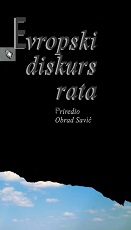
Prva zamisao ovog filozofskog zbornika o ratu njegovom diskursu nastala je početkom devedesetih godina. Ta zamisao nije bila lišena, tako da kažem, mirovnjačke diplomatije. U pozadini ubrzanih i veoma dramatičnih dogadaja u Jugoslaviji, postepeno koncepcijsko uobličenje zbornika poprimilo je didaktičke tonove. Ono što je ovaj zbornik nastojao da rekonstruiše u području teksta, ponovo je, u svoj žestini, progovorilo kontekstualno. U ranim devedesetim, javni diskurs su nasilno kolonizovali upravo oni elementi govora rata za koje sam verovao da su odavno otpisani i nepovratno arhivirani. Neprosvećene i sasvim primitivne forme militarističkog diskursa nezadrživo su provalile u svakodnevni život. Uprkos neobično čestom iskustvu rata, s kojim smo se ovde i sada ponovo susreli, iznenadio me je nizak teorijski nivo ratničkog diskursa. Pod naletom gole sile, procedura racionalnog argumentisanja sasvim je izostala: atavizam ratnih sredstava ponovo je preuzeo mandat kultivisanim inicijativama.
More...
The initial idea of this philosophical anthology on war and its discourse was formed at the beginning of the Nineties. This idea was not deprived of, so to say, pacifist diplomacy. In the background of accelerated and very dramatic events in Yugoslavia, gradual conceptual shaping of the anthology took on didactic overtones. That which this anthology attempted to reconstruct in the area of text started speaking again, with all vehemence, contextually. In the early nineties public discourse was forcefully colonized by precisely those elements of war talk which I believed had been long ago written off and irretrievably archived. Uneducated and totally primitive forms of militaristic discourse irrepressibly burst through into everyday life. In spite of exceptionally frequent war experience with which we have met here, and were now meting once again, I was surprised by the low theoretical level of war discourse. Under the surge of naked force, the procedure of rational argumentation was completely absent: atavism of war means once again overtook the mandate of cultivated initiatives.
More...
Platon u Državi govori o ratu kao o »temeljnoj veštini«, što znači da je rat posebna forma rada, moguća samo u okvirima organizovane »podele rada«, koja, opet, predstavlja vrhovnu veštinu pólisa. Rat je, dakle, »demijurg«. Upravo delo demijurga dovodi do krajnje granice destruktivno obeležje demijurškog - kao što kasnije kapitalizam do krajnje granice dovodi obeležje konstruktivnosti.
More...
Sukcesivno, nailazimo na tri problema: da li je bitka »predmet« rata? I još: da li je rat »predmet« ratnog stroja? Najzad, u kojoj je meri ratni stroj »predmet« aparata Države? Dvosmislenost prva dva problema zacelo proizlazi iz termina predmet, ali uključuje i njihovu zavisnost od trećeg termina. Zbog toga se i moraju razmatrati jedan za drugim, makar time bili navedeni da umnožavamo slučajeve. Prvo pitanje, pitanje bitke, stvarno zahvata neposredno razlikovanje dva slučaja: prvog, gde se bitka traži, i drugog, gde je ratni stroj suštinski izbegava. Ta dva slučaja uopšte se ne poklapaju sa ofanzivom i defanzivom. Međutim, izgleda da je predmet rata u pravom smislu te reči (prema jednoj zamisli čiji vrhunac nalazimo kod Foha) bitka, dok gerila za sebe izričito pretpostavlja ne-bitku.
More...
The urban landscape of Paris has been an important element of the diegetic space constructed by filmmakers for almost a century. Already in the 1920s, René Clair and Alberto Cavalcanti placed locale of their films—representing the genre of urban symphonies—in the capital of France, making the urban space not only the background of screen episodes, but their full-fledged protagonist. Over the following decades, Paris has marked the boundaries of the world populated by the variety of characters, among which the category of immigrants deserves particular attention. Complex relations between foreigners and natives or state authorities have become the subject of numerous films belonging to beur cinema and cinéma de banlieue. The issue of assimilation, characteristic for foreign visitors, is shown on the example of the following films: La haine by Mathieu Kassovitz, Dheepan by Jacques Audiard, and Peur de rien by Danielle Arbid. In the chapter On the boundary of society. Images of Parisian immigrants in contemporary French cinema Marta Kasprzak proposes to treat the motif of the city's presence in films as a focal point for socio-cultural reflection that encapsulates the phenomenon of atrophy of social bonds, apparent cultural assimilation, and acts of violation of the applicable law or social orderThe urban landscape of Paris has been an important element of the diegetic space constructed by filmmakers for almost a century. Already in the 1920s, René Clair and Alberto Cavalcanti placed locale of their films—representing the genre of urban symphonies—in the capital of France, making the urban space not only the background of screen episodes, but their full-fledged protagonist. Over the following decades, Paris has marked the boundaries of the world populated by the variety of characters, among which the category of immigrants deserves particular attention. Complex relations between foreigners and natives or state authorities have become the subject of numerous films belonging to beur cinema and cinéma de banlieue. The issue of assimilation, characteristic for foreign visitors, is shown on the example of the following films: “La haine” by Mathieu Kassovitz, “Dheepan” by Jacques Audiard, and “Peur de rien” by Danielle Arbid. In the chapter “On the Boundary of Society. Images of Parisian Immigrants in Contemporary French Cinema” Marta Kasprzak proposes to treat the motif of the city's presence in films as a focal point for socio-cultural reflection that encapsulates the phenomenon of atrophy of social bonds, apparent cultural assimilation, and acts of violation of the applicable law or social order
More...
In the chapter entitled “Muriel Tramis’ »Méwilo« and »Freedom« as the First Postcolonial Games, Filip Jankowski examines two digital games accomplished by Muriel Tramis, a game designer from Martinique. The games picture the situation of African-Caribbean slaves and their descendants in a pioneering manner in terms of the medium used. “Méwilo” (1987) and “Fredom” (1988) were created under the influence of the philosophical thought in Martinique, shaped by the pioneers of postcolonialism such as Aimé Césaire and Frantz Fanon, as well as their critics impersonated by Édouard Glissant and Patrick Chamoiseau. Both games differ in terms of applied convention. “Méwilo”, which is a thorough documentary game, focuses on questioning the following inhabitants of the city of Saint-Pierre, the day before the devastating eruption of the Montagne Pelée volcano in 1902. The opposition between the black inhabitants of Martinique and their metropolitan torturers, although strongly outlined, is subject to problematization in both games. Among the main characters of the Tramis' works are black anti-heroes who imitate the French in their ambivalent attitude to the African-Caribbean community. Hence, they reflect the phenomenon of mimicry described by Homi Bhabha. All things considered, Jankowski argues both games to feature apparent postcolonial themes.
More...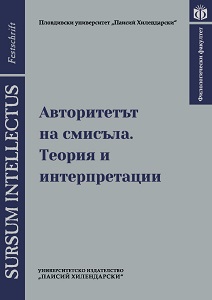
The current text aims at showing the place and role of the scientific inheritance of M. M. Bakhtin in the context of the humanitarian philosophical paradigm of XX and the beginning of XXI century. In time still marked by the crisis of postmodernist thinking, by the lost fundamentals and grounds of the very literature and the theory of literature itself, the philosophical and the aesthetic research of M. M. Bakhtin are a possibility for return. A necessary return to human and humanity, to responsibility and sense, by means of which and because of which we are.
More...